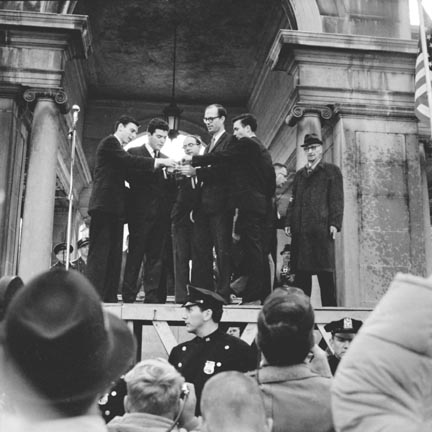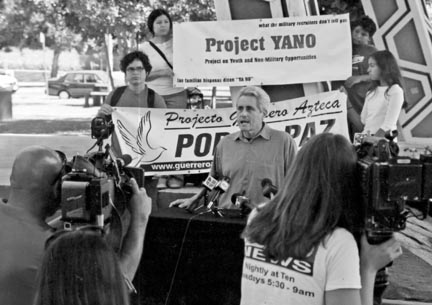
|
Muste
Notes | ||||||||
 |
Nov. 6, 1965: (L-R) Tom Cornell, Marc Edelman, Roy Lisker, David McReynolds and Jim Wilson burn their draft cards at Union Square in New York City as A.J. Muste looks on. |
In 1964, in the heated campaign between Barry Goldwater and Lyndon Baines Johnson, a great many in the peace movement (including me) urged a vote for LBJ, fearing, from Goldwater's own statements, that Goldwater meant war, and Johnson meant peace. However by the middle of 1965 it was clear Johnson was involved in a vast build-up of US forces in Indochina. It was war which would deepen, last until 1975, and ultimately cost the lives of over three million Vietnamese and nearly sixty thousand Americans.
Four men—Tom Cornell, a member of the Catholic Worker, along with Roy Lisker, Marc Edelman and Jim Wilson—decided to burn their draft cards. Congress had just passed a law to making the burning of draft cards illegal, and the four of them felt it was time for a dramatic challenge to that new law, and to the war. I agreed to join the action, in part because of a guilty conscience for having, a year earlier, been so sure the election of LBJ would limit the Vietnam War.
We made a first effort to burn the cards in late October 1965 near the Federal Court House in Foley Square, with A.J. Muste as the "host" of the event. However the press jammed in so close to us that it was impossible for A.J. to make any statement, or for any of us who were involved to burn our cards in a dignified way. A.J. called off the burning, and we rescheduled it for a later date in Union Square. Our co-workers built a platform at the north end of the square.
Dorothy Day of the Catholic Worker joined A. J. in hosting the draft card burning on November 6 in Union Square. Both made brief statements, and then each of the five of us stepped forward to burn our cards. (There was a moment of drama when someone who opposed us squirted us with water to put out the burning cards-we realized later that it could just as easily have been gasoline that he squirted!).
The draft card burning was attended not only by a large number of our supporters, but by a picket line of pro-war folks carrying signs with slogans such as "Burn Yourselves, Not Your Cards." There were police on the rooftops of the buildings around the square to guard against any snipers attacking us. We were emotionally keyed up when the burning was over, and as we left the platform, escorted by police to their patrol cars, we assumed we were under arrest. To our surprise, the police cars drove swiftly downtown to the old War Resisters League office at 5 Beekman St., and let us out there, telling us: "you should be safe now."
The arrests came later, at the hands of federal agents. Of the five who burned their cards, four went to prison for six months. I was not arrested, in theory because the FBI couldn't find enough of my draft card to be sure it was a draft card-but more likely because I had just passed my 35th year and the government doubted the law would be upheld if applied to someone past draft age.
There was a tragic note to the event. Roger LaPorte, a young Catholic Worker, set himself on fire near the United Nations building to protest the war shortly after our action, and died. It was believed by those close to Roger that he had been deeply disturbed by the level of violence among the pro-war crowd protesting our action, and saw his own action as a way of taking some of the violence onto himself.
That A. J. Muste played a key role in the November 6 draft card burning event was yet another example of his long history of supporting militant actions by youth-as well as taking such actions himself, of course.
-David McReynolds
 |
Project YANO activist Jorge Mariscal addresses reporters at an August 29 news conference in San Diego, announcing a national campaign to counter military recruitment among Latino high school and college students. |
The Muste Institute has supported the Project on Youth and Non-Military Opportunities (Project YANO) with six grants over the past 20 years, starting with a $500 grant in 1985, when the group was just a year old. In April of this year, we granted $1,500 to allow Project YANO to revise and restock its bilingual Spanish-English counter-recruitment literature for local and national distribution, and to make a counter-recruitment organizing manual available online. This article is by Project YANO Program Coordinator Rick Jahnkow.
Counter-recruitment work has offered what is probably the most effective way to materially interfere with the war in Iraq. With Army enlistment rates already causing a serious problem for military planners, new counter-recruitment efforts are mushrooming across the country, creating conditions that may force an end to the war much sooner than the Bush administration might desire.
For over two decades, Project YANO has been on the leading edge of counter-recruitment work. Founded in 1984, it is a grassroots organization based in heavily militarized San Diego County, California, home to several major US Navy facilities. In addition to educating local youths about alternatives to the military and exposing them to the realities of military enlistment and war that are disguised by recruiting propaganda, Project YANO provides resources and trains organizers for the growing national counter-recruitment movement. It also is a primary source for bilingual materials for Spanishspeaking communities that have been especially targeted by the Pentagon.
On August 29 of this year—the 35th anniversary of the 1970 National Chicano Moratorium against the Vietnam war—Project YANO joined the Latino Caucus of the National Network Opposed to the Militarization of Youth (NNOMY), the Guerrero Azteca Project for Peace, Coalition Against Militarism in Our Schools and Latinos For Peace in announcing a campaign by Latino organizers to demilitarize high schools and community colleges. Project YANO activist Jorge Mariscal addressed reporters at a news conference in San Diego, and similar press events were held that day in Chicago, El Paso, San Francisco, Los Angeles and Puerto Rico.
Among other things, the Latino campaign seeks to educate parents and students on how to opt out of military recruiting lists and avoid taking the military aptitude test (ASVAB) that is given in over 14,000 high schools annually. The website for ASVAB describes it as a "Career Exploration Program" but in fact it was developed by the Department of Defense to measure skills for military jobs. Recruiters convince schools to give the test so they can get personal information about students. The Pentagon is also using ASVAB to create a national database on all teenagers.
For more information, contact: Project YANO, P.O. Box 230157, Encinitas, CA 92023. Phone: 760-634-3604. Sample educational and organizing materials are available on the web at www.projectyano.org
-Rick Jahnkow
AFRICA
FAITH AND JUSTICE NETWORK
Washington, DC: $1,500
This grant goes for
educational materials and organizing resources to help launch the Uganda Conflict
Action Network, a grassroots campaign to raise public awareness in the US and
internationally for a just solution to the 19-year old armed conflict in Uganda.
Africa Faith and Justice Network, founded in 1982, is sponsoring the campaign.
http://afjn.cua.edu/
ANJUMAN
BRA-E-KHAWATEEN (ABK) ASSOCIATION OF WOMEN
Punjab, Pakistan: $1,500
ABK was formed in 1996 as a voluntary association of rural women with the mission
of empowering women for a self-reliant and dignified life. Following a day of
action on International Women's Day in 2005, ABK helped organize the Women Peacemakers
Network, bringing together 28 women's groups from six rural districts of Punjab
province. This grant goes for the "Mothers as Peacemakers" project, organizing
women in the six districts to promote a culture of peace and nonviolence.
BOSTON MOBILIZATION
Cambridge, MA: $1,500
Boston Mobilization began in 1977 as a local chapter
of the then nationwide anti-nuclear organization Mobilization for Survival. Over
the last five years, the group has renewed its activity as a largely youth-run
organization. This grant goes for efforts to mobilize the public against Boston
University's plans to build a Level 4 Bio-Weapons laboratory in Roxbury, a low-income
community of color. http://www.bostonmobilization.org/
CORVALLIS COUNTER
RECRUITMENT COMMITTEE
Corvallis, OR: $500
This all-volunteer group formed
in April 2005 as a subcommittee of Corvallis Alternatives 2 War, a local grassroots
anti-war organization. Our grant goes for educational materials, speakers and
displays to inform students, parents and community members in the Corvallis area
about recruitment, military service and alternatives. http://www.alt2war.peak.org/
GLOBAL WOMEN'S STRIKE
Philadelphia, PA: $1,500
Global Women's Strike is a network of women
in over 60 countries who act together to demand that governments "invest in caring,
not killing." This grant goes for counter-recruitment work in Philadelphia's low-income
communities, including a campaign to inform parents, students and community members
about the right of students to "opt out" of military recruitment. The campaign
is being carried out in partnership with two affiliated groups, Women of Color
in the GWS and Payday, a multiracial men's network. http://www.globalwomenstrike.net/
LEHIGH-POCONO COMMITTEE
OF CONCERN (LEPOCO)
Bethlehem, PA: $1,000
Founded in 1965 to oppose
the US war in Vietnam, LEPOCO now has more than 500 members in the Lehigh Valley
area of eastern Pennsylvania. This grant goes for efforts to provide information
about military service and alternatives to students; and for trainings to help
young activists explore the practice and potential of nonviolence. http://www.lepoco.org/default.htm
PEACE AND SOCIAL
JUSTICE CENTER OF SOUTH CENTRAL KANSAS
Wichita, KS: $1,250
Since 1992,
the Center has been educating and organizing around issues including war, globalization,
gender rights, the juvenile justice system and the death penalty. This grant goes
for organizing, outreach and followup around the Iraq War Conference, helping
activists in South Central Kansas to develop strategies and focus their anti-war
efforts. http://www.wichitapeace.org/
YOUTH FORUM FOR
PEACE AND JUSTICE
Kitwe, Zambia: $1,250
This group has been training
youth and students in peace building skills since May of 1999 in Zambia's copper
belt region, and has fostered the creation of numerous "Peace and Justice Clubs"
in schools throughout the region's ten cities. Our grant goes to further build
the work of the Peace Education Project. http://www.unoy.org/ANwk_org_Zambia_Youth%20Forum%20for%20Peace%20and%20Justice.htm
The A.J. Muste Memorial Institute makes small grants to groups doing nonviolent organizing for social change. Our next deadline for proposals is April 14, 2006. To read our grant guidelines, click here.